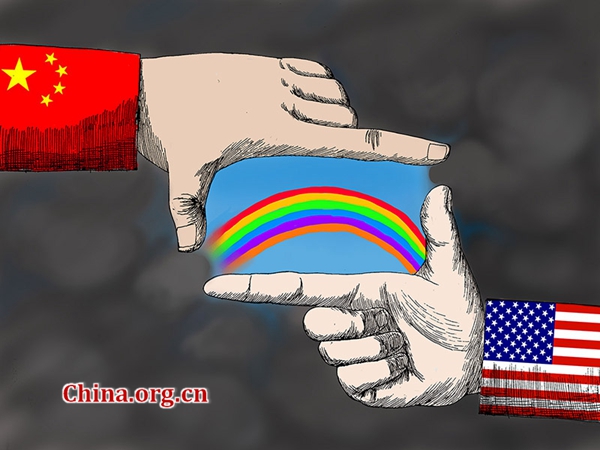Progress in US-China ties
- By Sabena Siddiqui
 0 Comment(s)
0 Comment(s) Print
Print E-mail China.org.cn, May 18, 2017
E-mail China.org.cn, May 18, 2017
|
|
|
Contrary to fears of worsening China-U.S. relations after President Donald Trump took office, improvements have appeared with remarkable speed. [Zhang Xueshi/China.org.cn] |
As a result, Matthew Pottinger, U.S. National Security Council senior director for East Asia, led an American delegation attending the Belt and Road Forum for International Cooperation (BRF) in Beijing on May 14-15.
Pottinger announced shortly after his arrival in Beijing that, "American firms have a long and successful record in global infrastructure development, and are ready to participate in Belt and Road projects….offering best-value goods and services required over the life of a project."
This is a significant "ice-breaker" and a valuable gesture of goodwill. China's win-win foreign policy has been successful, as evidenced by the presence at the BRF of the U.S., South Korea, the EU and Japan, omitting only India.
At the opening of the Forum, President Xi Jinping said he visualized the Belt and Road Initiative as an open one that would achieve both economic growth and balanced development, adding: "We should build an open platform of cooperation and uphold and grow an open world economy."
Availing themselves of this "open plan" concept, the U.S. embassy in Beijing and various American companies have teamed up to form an "American Belt and Road Working Group" in recognition of the fact that the Initiative is in line with America's own priorities of infrastructure development and creation of American jobs.
After the trade deal was signed, Secretary of Commerce Wilbur Ross described U.S.-China relations as "hitting a new high, especially in trade." He went on to call it "a herculean accomplishment," representing the greatest advance in the bilateral trade relationship.
Ostensibly, this is the first takeaway from the trade talks initiated last month after the Xi-Trump meeting in Florida persuaded the Trump administration to adopt a softer approach and avoided confrontation, despite various lobbies in Washington pressing for a tough line on Chinese investment.
China has reciprocated with a plan to send a delegation to the U.S. in July, the terms of engagement being that Chinese investment should be on a par with that from other countries.
Investments in American infrastructure are set to grow through this collaboration as the joint statement declared: "The U.S. welcomes direct investment by Chinese entrepreneurs as it does by entrepreneurs from other countries."
Henceforth, China will allow American or other foreign owned groups to offer financial and credit-rating services from July 16; soon, MasterCard and Visa will be applying for licences to operate within China and settle Renminbi payments there.Two major American financial institutions are going to be issued settlement licences and bond underwriting.
Prior to his meeting with President Xi, Trump had pledged to address the $350 billion trade imbalance favouring China within 100 days. Thus, it was encouraging that the deal was decided on a fast-track basis, as Ross disclosed in a White House press briefing, adding: "Normally trade deals are denominated in multiple years, not tens of days."
In a nutshell, the lucrative trade deal boosts shipments of American liquefied natural gas, beef and other products to China, while Chinese banks and poultry produce get access to the American market. The deal sorts out many of the trade barriers that American companies used to complain about.
However, it is not viewed as a major breakthrough as yet in financial circles merely serving to raise expectations that China might accept more American exports in the near future. Notwithstanding that perception, it can be assessed as an important move in the right direction.
As described by Professor of Finance at Peking University, Christopher Balding, the developments are a "positive stepping stone" towards better U.S.-China ties.
Such remarkable progress in China-U.S. ties would not have been possible during the Obama administration, having backed the Trans-Pacific Partnership that sought to contain China. One of Trump's first actions was to pull the United States out of that agreement.
The current trade deal and the presence of the U.S. delegation at the BRF has raised questions whether the U.S. will likewise reconsider Obama's decision not to join the AIIB bank, which is about to announce new members soon.
Undoubtedly, President Trump's emerging China policy is unlike his presidential campaign rhetoric as he holds a very high opinion of President Xi as "a great guy."
Further high-level China-U.S. talks will be held in the summer to map out a one-year plan with an expectation that remaining contentious issues will be resolved.
Sabena Siddiqui (Twitter: @sabena_siddiqi) is a foreign affairs journalist and lawyer based in Pakistan.
Opinion articles reflect the views of their authors, not necessarily those of China.org.cn.







Go to Forum >>0 Comment(s)